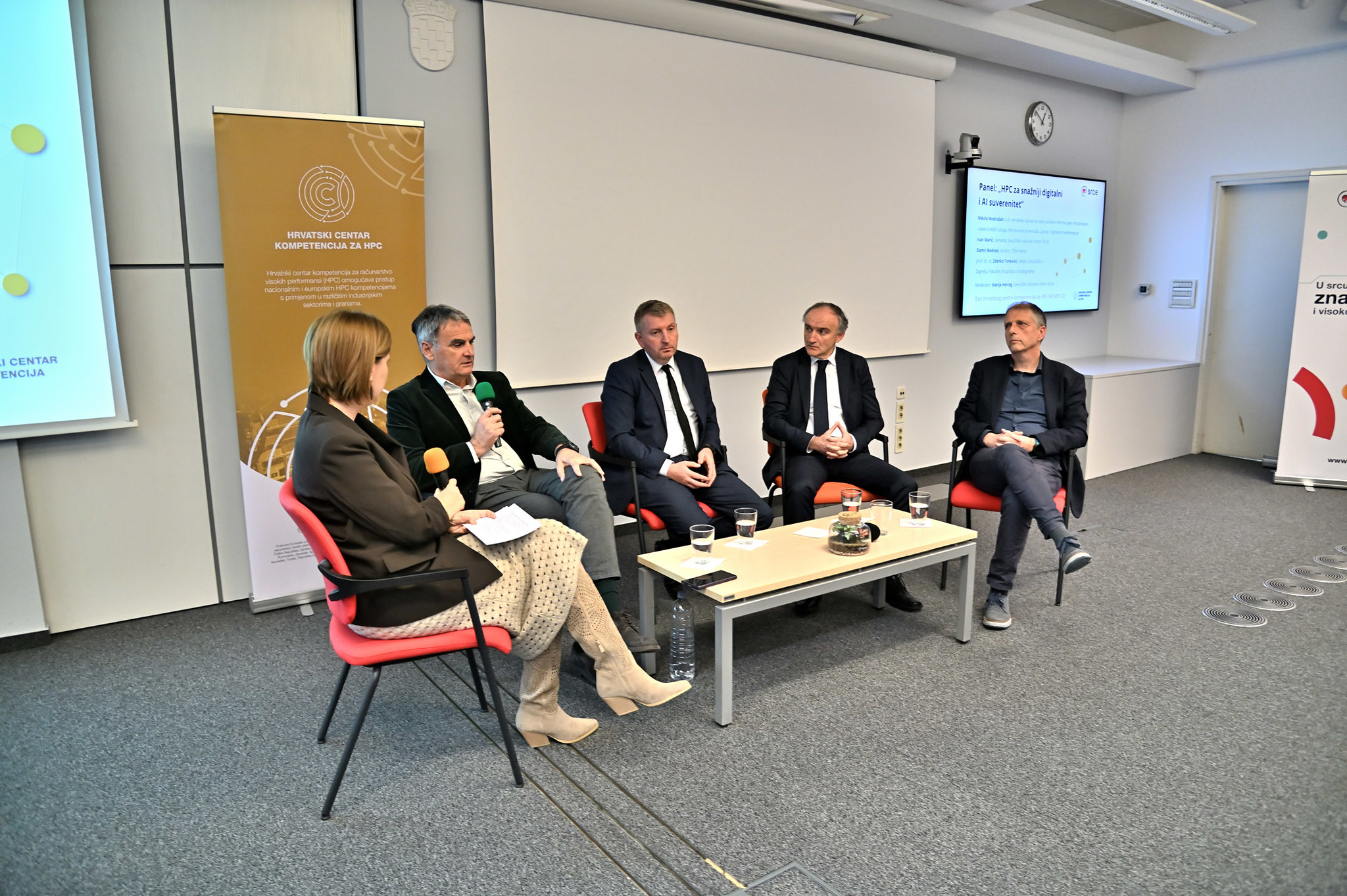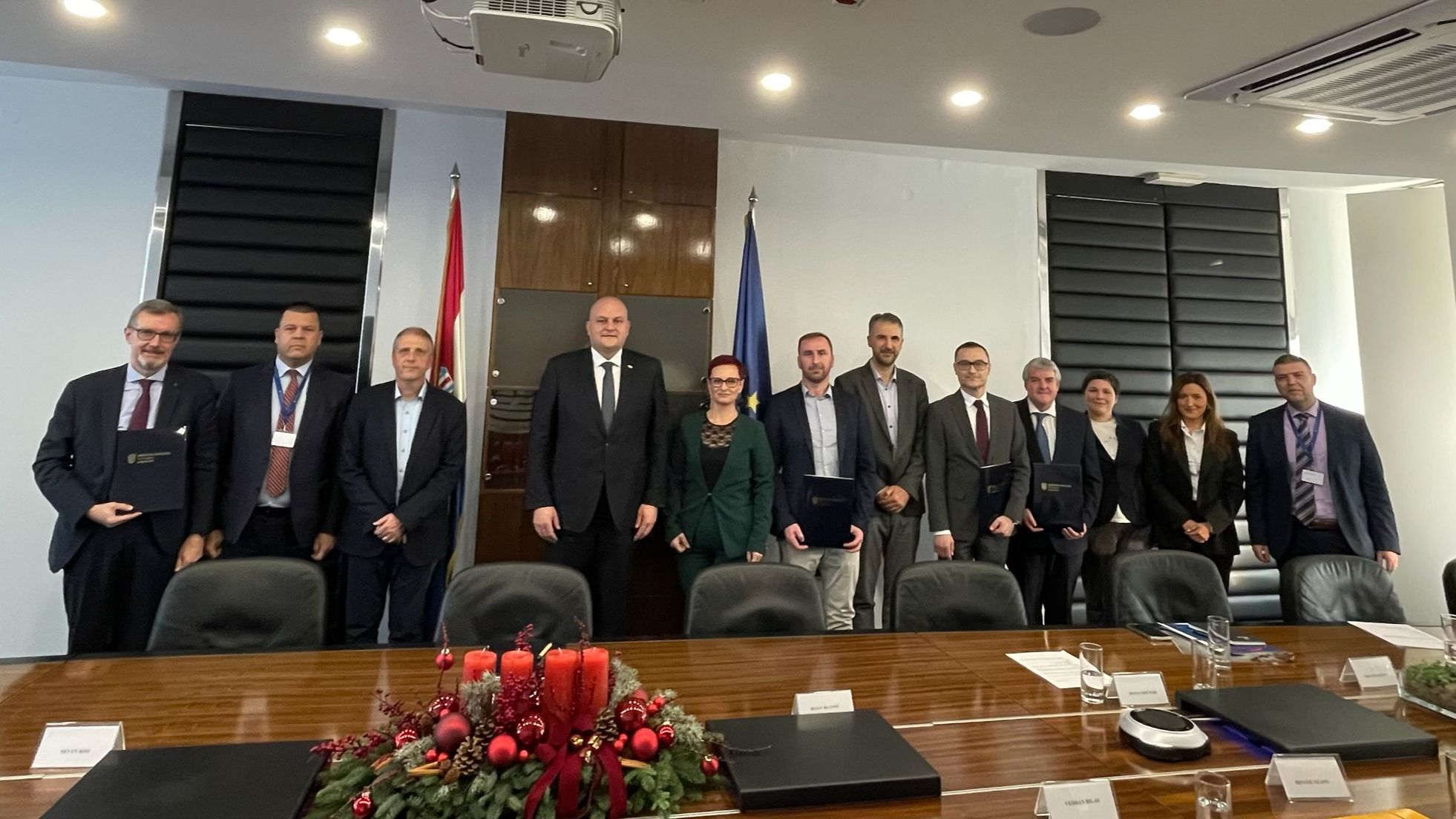EDIH ADRIA participated in the third Day of the Croatian Competence Centre for HPC, which was organized on 11 and 12 November by the University Computing Centre SRCE, bringing together national and European experts in the field of high performance computing (HPC).

Event programme
The event started with a radio “HPC for Entrepreneurs” where participants had the opportunity to learn about the basics of HPC architecture and technology and available national and international HPC resources. Practical work included access to SRCE's advanced computing resources, preparing data for processing, selecting the programming environment and executing applications.
The second day of the program brought an overview of HPC landscapes in Europe and Croatia, with presentations of the results of the work of the Croatian Competence Centre for HPC, the activities of the European Joint Undertaking for HPC (EuroHPC JU), and Slovenia's experience in launching an AI factory.
Four examples of the practical application of HPC are presented: Development of innovation in health through AI4Health.Cro challenge (dr. sc. Anja Barešić), password security analysis (prof. dr. sc. Toni Perković, FESB Split), complex calculations in computer fluid dynamics for determination of ship hydrodynamics (dr. sc. Inno Gatin, Cloud Towing Tank), and automating compliance audit and risk assessment procedures in IT systems (Stanko Cerin, Ostendo Consulting).
Panel: HPC for stronger digital and AI sovereignty
The central part of the event was a panel on “HPC for stronger digital and AI sovereignty” in which they participated:
- Nikola Modrušan, Acting Director of the Directorate for Development of State Information Infrastructure and Electronic Services, Ministry of Justice, Administration and Digital Transformation
- Prof. dr. sc. Zdenko Tonković, Dean of the Faculty of Mechanical Engineering and Naval Architecture, University of Zagreb
- Ivan Marić, Director of the University Computing Centre (Srce)
- Damir Medved, Director of EDIH Adria

Key statements by the panellists
Nikola Modrušan pointed out that: “We are at the final stage of drafting the Proposal for a National Plan and Action Plan for the Development of Artificial Intelligence in the Republic of Croatia. One of the more important thematic strands in the plan will be dedicated to the establishment of a national AI digital infrastructure as a cornerstone of AI sovereignty. The establishment of such a national AI infrastructure involves a number of activities, ranging from the construction of high-speed optical networks and data centres, to the acquisition and installation of specialised supercomputers for AI, to the construction of a common Croatian language resource. But ultimately the average citizen is not interested in infrastructure, he is interested in simple, fast and efficient services."
Ivan Marić stressed that: “Supercomputers and data are key components for further research and implementation of AI technologies, but the expert support and knowledge provided by the Centre to users in accessing and using HPC resources is an important element of the final successful applications in research, industry and the public sector. Therefore, promotion, education for the application of HPC technologies as well as connection with the economy are as important as technology itself, and it is extremely important to strengthen institutional capacities. Today's competitiveness of Europe, including Croatia, is based on successful technology management, in which such centres as the Croatian Competence Centre for HPC make a strong contribution."
Damir Medved, Director of EDIH ADRIA, pointed out: “While there is a very low level of knowledge of the application of HPC in SMEs, through the activities of our EDIH Adria we have been able to make them aware that AI technologies can help them a lot, for example to create AI agents that enhance business processes, but also to make functional prototypes themselves and to help them in doing so. At the same time, it is important that we have our own infrastructure, but also a national language corps that ‘spins’ on this infrastructure, because no one else will care about our language but ourselves. And apart from hardware, we need to work more seriously on software, and data – no AI without data, no algorithms if we don’t have data.”
Prof. dr. sc. Zdenko Tonković added: “Our students, at all stages of their studies, perform applied tasks from the industry, for example simulations on such advanced resources of SRCE, and then transfer these experiences and knowledge to companies, which is how we all learn together. The FSB has a great opportunity because it has over 350 companies in which students go to practice. Our aim is to make it clear that it is the academic community that is at the service of society and the community, and that only knowledge and putting people at the centre is essential.”
Panel conclusions
The panelists agreed that Development and regular upgrade of national HPC infrastructure crucial for Croatia's digital and AI sovereignty and that national and European financial support should be aligned with the long-term plan in order to reduce dependence on project funding.
The main obstacles identified are:
- Lack of knowledge and insufficient transfer of knowledge from the academy to the economy
- Perception of complexity and lack of knowledge of available resources
- Lack of human capacity and education for HPC and AI
- Lack of Croatian LLM as a basis for the development of key AI applications
The need for stronger and sustained cooperation between the state, academia and industry in order to use resources efficiently and turn them into innovations was highlighted. Although Croatia missed the opportunity to establish a national AI factory in previous calls, there is no need to stop working on the establishment of a national centre that would integrate infrastructure, data, knowledge and industrial partners.
EDIH ADRIA, in top 5% of the 225 European digital innovation hubs in terms of results, continues to work actively to raise awareness among SMEs of the opportunities offered by HPC and AI technologies, and to support the development of functional prototypes through the ‘Test Before Invest’ programme.






